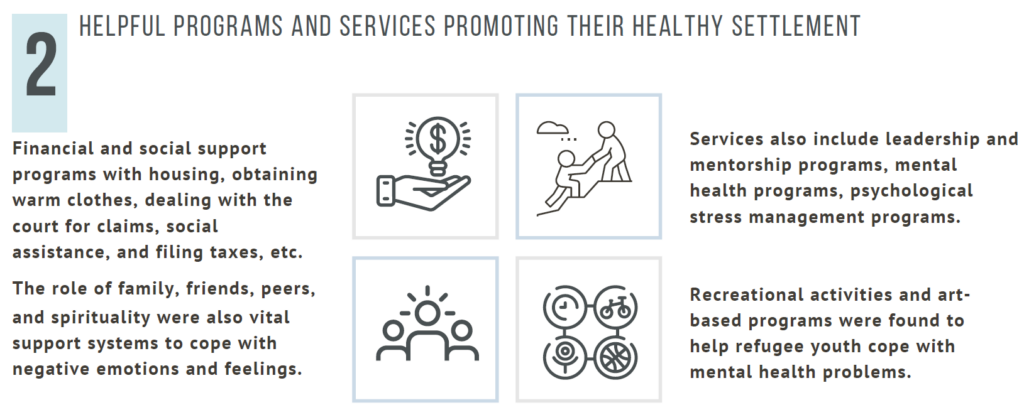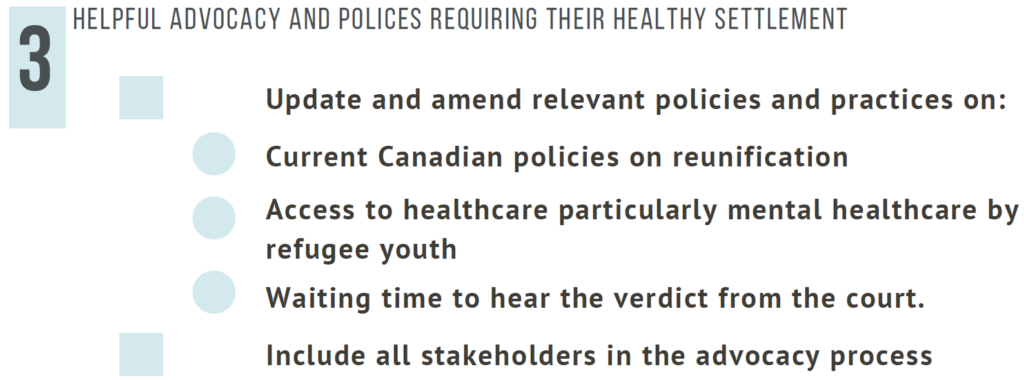Supporting Refugee Youth: From Research to Practice

This project addressed the critical issue of family loss and separation and its profound impact on the mental and social well-being of refugee youth. Refugee youth are a particularly vulnerable population, often facing significant challenges in their trans-migration settlement process. There was a gap in the existing literature regarding the specific effects of family separation and loss on refugee youth. This project fills that gap by providing evidence-based recommendations to improve refugee youth well-being and facilitate successful settlement in Canada. These recommendations provide all stakeholders, from practitioners to policymakers, with the insights and tools necessary to offer effective, trauma-informed support.
In this overview we provide resources for practitioners to policymakers, enabling you to translate research findings into practical actions and improve the support available to separated refugee youth.
What did we do?
This project was a collaborative effort led by Access Alliance, involving community partners such as OCASI, the Canadian Centre for Victims of Torture (CCVT), Across Boundaries, and FCJ Refugee Centre, along with peer researchers, and experts from the Wellesley Institute and York University. This approach ensured that the research was grounded in the realities of the community and that findings were relevant to those it aimed to support.
The primary objectives of this project were to:
- explore how family loss and separation affect the mental and social well-being of refugee youth.
- identify effective interventions, services, and policies to support these youth.
- develop practical tools and resources for practitioners working with this population.
This study used a multi-phased sequential mixed-methods approach. It began with a scoping review of existing literature, followed by focus group discussions with service providers and then with refugee youth who had experienced family loss or separation. The data from these sources were analyzed using a collaborative model that included trained peer researchers.
The scoping review used a systematic search strategy and the PRISMA-ScR model to analyze peer-reviewed articles from major databases and open-source journals. The Critical Appraisal Skills Programme (CASP) tool was used to evaluate the quality of search of the selected articles. The scoping review aimed to map the extent, volume, and attributes of the existing literature. The scoping review findings were publicized to receive feedback for the modus operandi of the rest of the research process.
Grounded on the scoping review data and the expert opinion in the first-round, next level operational data was collected in series through five focus group discussions: two with service providers and three with refugee youth. These discussions explored the experiences, needs, and perspectives of participants regarding family loss and separation. The focus groups with refugee youth used a peer researcher model to foster a comfortable environment and encourage open communication.
What did we learn?

Impact of Family Loss
Family loss and separation significantly affect the mental health of refugee youth, leading to a higher prevalence of post-traumatic stress disorder (PTSD), depression, and anxiety. These mental health challenges can be intensified by experiences of post-traumatic guilt and shame.
Migration Journey
The migration journey itself is often traumatic for refugee youth. They experience violence, loss, exploitation, deprivation, and perilous travel. Family separation can occur at any stage of this journey, compounding the challenges they face.
Post-Migration Challenges
When they arrive in Canada, refugee youth encounter numerous challenges. These include navigating a new education system, financial insecurity, housing instability, systemic discrimination, language barriers, and a lack of recognition of their previous education credentials.
Coping Mechanisms
While refugee youth develop resilience and coping mechanisms, they continue to face considerable mental health challenges. Social support is essential in mitigating mental health challenges. Support from peers and mentors can be particularly important for processing stressful life events. Lower social support can intensify PTSD, depression, and anxiety symptoms.
Effective Interventions
Programs and services that have proven helpful include leadership programs, mentorship, mental health workshops, stress management, and recreational activities. These programs help to create a sense of community and provide opportunities for social engagement and emotional expression.
What recommendations came out of this project?
For Service Providers

Effective programs should include direct consultation with refugee youth and community mobilization strategies. Culturally competent and accessible language and mediation services are also important. Services must be accessible in terms of cost, availability, and language. Service providers should adopt trauma-informed approaches to effectively meet the needs of refugee youth. The project makes specific recommendations to improve service delivery for refugee youth in Settlement services, temporary and transitional shelters, employment, and education services.
Practitioners should adopt a strengths-based approach that recognizes the inherent resilience of refugee youth. This involves positioning refugees as key stakeholders in decision-making and policy advocacy. Programs should actively address systemic inequalities that prevent refugees from developing social support and community networks.
A service provider Community of Practice would be useful to share promising practices and replicate effective interventions for separated refugee youth. This Community of Practice should be made up of a broad group of service providers, such as Community Health Centres, Settlement organizations, youth employment services, community and recreation programs and services, mental health service providers, and informal youth groups and communities.
Several interventions have been found to be beneficial for the mental health of refugee youth. These include:
- Trauma-focused cognitive behavioural therapy (TF-CBT) has shown positive results in reducing symptoms of PTSD.
- Creative Art therapies allow youth to express feelings through different art mediums and have been shown to decrease symptoms of trauma.
- Creating opportunities for social engagement, accessing material resources, and developing skills to empower youth are helpful.
- Providers who understand the unique needs of refugee youth, build cultural sensitivity and address language and cultural barriers in their services are better able to engage with this population and facilitate positive outcomes.
- Creating “safe spaces” where refugee youth can speak about mental health challenges that are free from judgement and stigma may encourage the youth to seek help and support.
For Funders and Policymakers

There needs to be a shift in policies that reduce wait times for claimant decisions, expedite family reunification, improve access to healthcare, and allow youth to access services in their preferred language. Policies should also ensure access to affordable housing and education, regardless of claimant status.
Our Knowledge Mobilization Activities
This project created a number of reports and resources you can read and watch to learn more.
Final report – Loss and Protracted Family Separation among Refugee Children and Youth Examining Post-migration Impacts and Service Needs (2021)
Community Report: Read a detailed community report (PDF) that focuses on the impact of family loss and separation on the well-being of refugee youth during settlement in Canada.
Short Film: Watch a short film that narrates the key findings of our research report through the voice of a refugee youth.
Publications: Explore links to published articles and reports related to this research project.
- Project Executive Summary
- Project infographic – Loss and Protracted Family Separations among Refugee Children and Youth: Examining Post-Migration Impacts and Service Needs
- Resilience Mechanisms and Coping Strategies for Forcibly Displaced Youth: An Exploratory Rapid Review
- A Practice-based Methodology on Conducting a Collaborative Scoping Review with PRISMA-ScR Model for the Separated Refugee Youth Project
- Mental Health Issues Affecting Refugee Youth in Canada who Experienced Family Loss and Separation in their Country of Origin
- Impact of Family Loss and Separation on Refugee Youth: Implications for Policy and Programs
- Impact of Social Isolation on Refugee Children and Youth
Practitioner Toolkit: A toolkit was designed to support practitioners conducting community-based research with refugee youth. This toolkit will be updated in the near future.
Resource List: In 2020 we created a comprehensive list of available services across different cities in Canada. This list is categorized by the type of support offered, such as settlement, education, employment, mental health, and social resources in different cities. We provide this list as an archival resource. It is currently out of date and should not be relied on to make current referrals. You may find it useful to learn about the different types of programs and services available. Contact your local 211 service provider to get up to date information.
Policy Statement: Review a policy statement that highlights key advocacy points and the need for policy changes to support refugee youth.
Information webinar: Lead researcher Akm Alamgir led a CAMH webinar in December 2021 which provides an overview of the project and research activities.
Research Team
- Akm Alamgir (Access Alliance)- Co-Principal Investigator
- Serena Nudel (Access Alliance)- Co- Principal Investigator
- Kwame McKenzie (CAMH/Wellesley Institute)
- Brenda Roche (Wellesley Institute)
- Michaela Hynie (York University)
- Manolli Ekra (OCASI)
- Branka Agic (CAMH)
- Amjed Abojedi (Access Alliance) – Immigrant Insight Scholar and Peer-Researcher
- Musammat Badrunnesha (Access Alliance) – Immigrant Insight Scholar and Peer-Researcher
- Gemechu Abeshu (York University)- Placement Student and Peer-Researcher
- Sara Daou- MPH Student of U of T and Peer researcher
- Dalia Al-Nuaimi – Peer researcher
- Huda El-Zein- U of T (placement) student for New College Independent Study Course.
Contact Information
For further inquiries or support, please contact research@accessalliance.ca.
